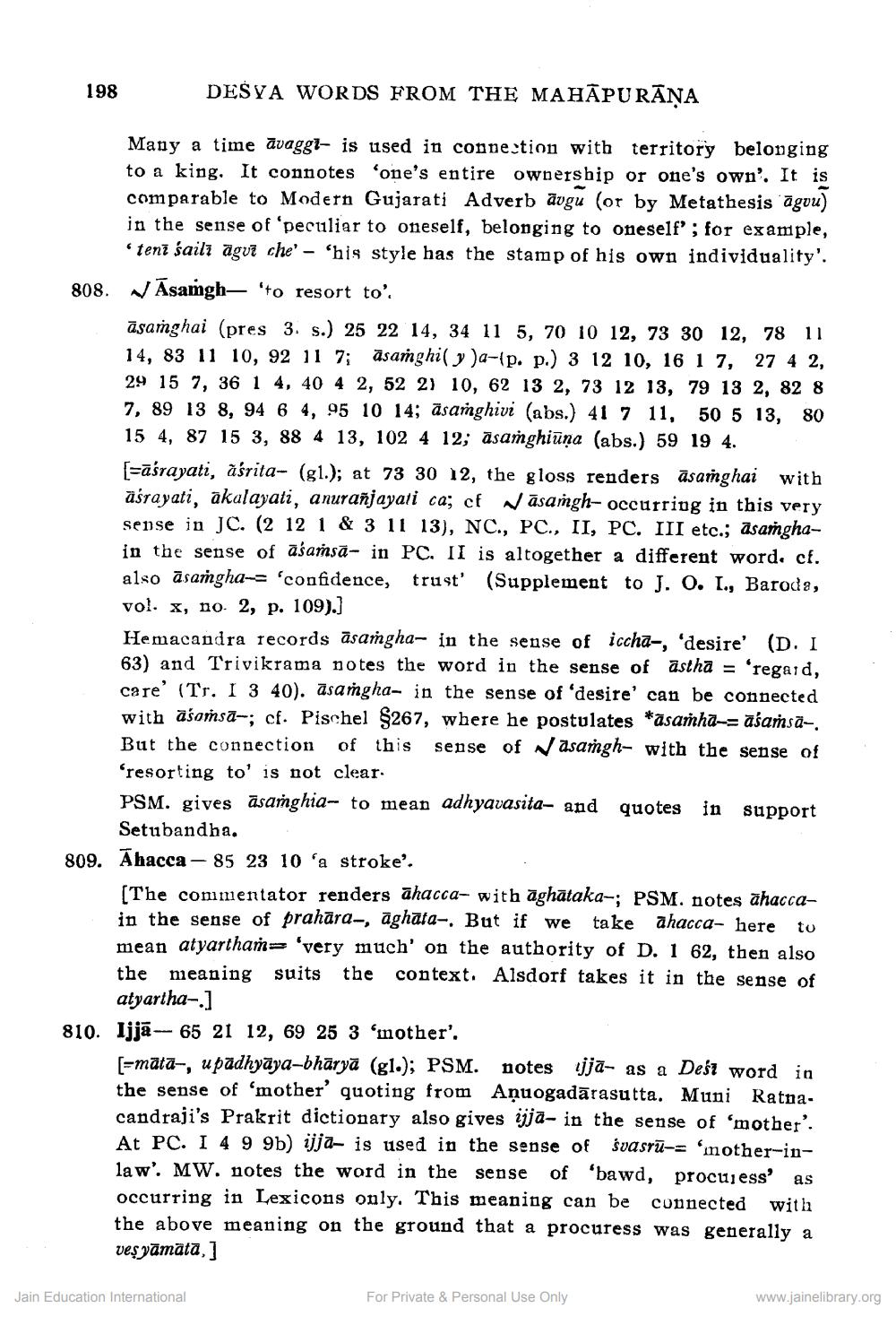________________
198
DESYA WORDS FROM THE MAHĀPURĀŅA
Many a time āvaggi- is used in conne:tion with territory belonging to a king. It connotes 'one's entire ownership or one's own'. It is comparable to Modern Gujarati Adverb avgu (or by Metathesis āgvu) in the sense of 'peculiar to oneself, belonging to oneself'; for example, teni śaili ägvī che' - 'his style has the stamp of his own individuality'.
808.
Asamgh- 'to resort to'.
āsamghai (pres 3. s.) 25 22 14, 34 11 5, 70 10 12, 73 30 12, 78 11 14, 83 11 10, 92 11 7; asamghil y )a-ip. p.) 3 12 10, 161 7, 27 4 2, 29 15 7, 36 1 4, 40 4 2, 52 21 10, 62 13 2, 73 12 13, 79 13 2, 82 8 7, 89 13 8, 94 64, 95 10 14; āsañghivi (abs.) 41 7 11, 50 5 13, 80 15 4, 87 15 3, 88 4 13, 102 4 12; āsanghiūna (abs.) 59 19 4. [=aśrayati, ăśrita- (gl.); at 73 30 12, the gloss renders āsamghai with asrayati, akalayati, anurañjayati ca; cf āsangh-occurring in this very sense in JC. (2 12 1 & 3 11 13), NC., PC., II, PC. III etc.; asaṁghain the sense of aśarsā- in PC. II is altogether a different word. cf. also āsasgha-- 'confidence, trust' (Supplement to J. 0. L., Baroda, vol. x, no. 2, p. 109).] Hemacandra records āsamgha- in the sense of iccha-, 'desire' (D. I 63) and Trivikrama notes the word in the sense of astha = 'regard, care' (Tr. I 3 40). asaṁgha- in the sense of desire' can be connected with āśamsa—; cf. Pischel $267, where he postulates *asamha-s āśaṁsā-. But the connection of this sense of asaṁgh- with the sense of ‘resorting to' is not clear. PSM. gives āsarghia- to mean adhyavasita- and quotes in support
Setubandha. 809. Ābacca - 85 23 10 'a stroke'.
[The commentator renders āhacca- with āghataka-; PSM, notes āhaccain the sense of prahāra-, aghata–. But if we take ahacca- here to mean atyartham= 'very much' on the authority of D. 1 62, then also the meaning suits the context. Alsdorf takes it in the sense of
atyartha-] 810. Ijjā - 65 21 12, 69 25 3 'mother'.
semata-, upadhyāya-bhāryā (gl.); PSM. notes ijja- as a Deść word in the sense of 'mother' quoting from Aņuogadārasutta. Muni Ratnacandraji's Prakrit dictionary also gives ijja- in the sense of 'mother'. At PC. I 4 9 9b) ijja- is used in the sense of svasrū-= 'mother-inlaw'. MW. notes the word in the sense of 'bawd, procuiess' as occurring in Lexicons only. This meaning can be connected with the above meaning on the ground that a procuress was generally a veşyāmata, ]
Jain Education International
For Private & Personal Use Only
www.jainelibrary.org




